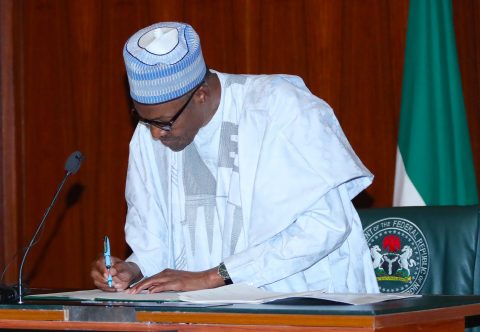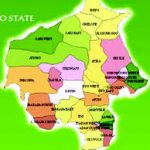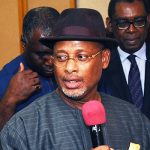OPINION: Still On Buhari’s Asset Forfeiture Order
Articles/Opinion, Featured, Latest Headlines, Politics Monday, July 23rd, 2018
By Sufuyan Ojeifo
(AFRICAN EXAMINER) – President Muhammadu Buhari, who went into the 2015 presidential election on the crest of a countrywide approbation as a man of integrity, could not have come better recommended by Nigerians for the task of clearing the nation’s Augean stables. On the force of his antecedents and credentials, he was expected to hit the ground running in a comprehensive battle against corruption since that credibility motivated the national support for his candidature and forged, in the main, the crux of the social contract that has approximately exemplified his presidency of Nigeria.
Sadly, no sooner had the administration commenced than its anti-graft machinery began to falter. Politics and other mundane considerations contoured the mandate. In the corollary, there has been a yearning gap between expectations and realities. The battle has been largely mismanaged and the initial gravitas has ebbed. The superintending administrative infrastructure of the Economic and Financial Crimes Commission (EFCC) has been largely indicted as selective in the execution of the war. The Commission has been fumbling in its investigative and prosecutorial strategies, leading to serial losses or stalling of high-profile corruption cases filed under this administration.
Certainly, there is a sense in which Buhari could be insulated from blame over the mismanagement of the anti-graft war by his agents. That good judgment will be in the context of his prompt disposition to whip them into line or re-jig their administrative infrastructure. But he has been reluctant to replace Ibrahim Magu despite his non-confirmation on two occasions by the Senate as substantive chair of the EFCC. The president must have his reasons for sticking with Magu. Whatever the reasons are; they must be far from pecuniary.
Buhari is a principled man whose financial integrity is difficult to impeach. I voted for him in the 2003 presidential election because he came highly recommended to me by my late godfather, Chief Sunday Awoniyi, whose anecdotes about Buhari’s integrity were convincing. He told me how Buhari as federal commissioner of petroleum resources and he, as permanent secretary in the ministry, forced a foreign company to reduce drastically the sum of some critical contracts in the nation’s downstream sector.
The real gist of the story by which I became enamoured of Buhari and Awoniyi was not the amount that was yanked off but the request by the company that they furnished it with some foreign accounts into which to pay in for them the amount negotiated off. According to him, they rejected the proposition with indignation. Those who knew Awoniyi would recall with confirmatory assertion his parsimonious and Spartan life style. He lived in his own world that bears similitude with Buhari’s. It is, perhaps, for the sustenance of that integrity exemplar that Buhari has been divinely enabled to be president at this time to prove that financial propriety and discipline in the management of public finance is possible.
At the outset of the administration in 2015, Nigerians were ready to give the president the essential support to fight corruption; extraordinary measures would have been welcomed against the backdrop of the malaise of institutional corruption. But just like he vacillated as head of state in dealing with some cases of corruption in the highest echelon of his junta and paid dearly for it with a palace coup that ousted him, Buhari had vacillated on the current anti-graft war for too long before coming up with the much more pragmatic Executive Order No. 6 on assets forfeiture.
That the order has continued to draw nationwide flaks, especially from the oppositions and lawyers on the grounds of its perceived unconstitutionality, derives from its impolitic timing. The order came at a time that the anti-graft war has been largely compromised, bastardised and unraveled for what it, unfortunately, has become: a tool in the hands of the governing party to intimidate, harass and blackmail the oppositions. Had the order been signed in the first three months of the administration in 2015, the opposition and public disposition would have been different.
Buhari would have benefitted from uncommon support to recover our commonwealth that had been plundered and privatised by some few individuals. There is, indeed, a national consensus that cumulative years of financial misappropriation by successive administrations have had far-reaching implications for our nation. Basic questions of provision of good roads, uninterrupted power supply, efficient health care delivery and other salutary development infrastructure remain unanswered. It is sardonic that our nation has suffered stunted growth over the past years despite the huge financial accretions from the sales of our crude oil. This is the parody of our reality as a suffering people in the midst of plenty.
According to the recent Brookings report, Nigeria had just overtaken India as the global poverty capital. The argument that the narrative could have been different if we had been blessed with good leaders resonates well in the context of historical comparativeness of disciplined and revolutionary leaderships in some other climes with leadership offerings here. Lee Kuan Yew in Singapore would always serve as a good example of how the determination of one man to change the negative narrative of backwardness can birth change the course of history and institutionalise transformational leadership as articles of faith.
Other postwar leaders who wrought drastic social, economic or political change in their countries included, among others, Brazil’s Luiz Inacio Lula da Silva, South Korea’s Kim Dae-Jung, Colombia’s Alvaro Uribe Velez, Egypt’s Gamal Abdel Nasser, Poland’s Lech Walesa, China’s Deng Xiaoping and United Arab Emirates’ Sheik Zayed bin Sultan Al Nahyan. This is why it is somewhat painful that Buhari has allowed some renegades in his administration to cast a slur on his integrity capital. The contents of their characters are not in pari materia with the Buhari exemplar.
While it can be argued that the president is not perfect, there are vices that even his most visceral critics cannot associate him with. In financial matters he is beyond reproach. It is in this context that he remains the nation’s undisputed anti-corruption poster child. His assets forfeiture order should be ensconced in the hearts of a vast majority of Nigerians who have suffered collective deprivation as a result of the thievery by successive leadership acting in cahoots with top-level civil servants. A presidential panel headed by the Special Assistant to the President on Prosecutions, Mr. Okoi Obono-Obla, recently disclosed that government was investigating over 400 names of past and present public servants linked to ownership of suspicious property in the highbrow Maitama district of Abuja. This is in apple-pie order.
While it may be convenient for the opposition elements especially those whose hands have been caught in the cookie jar of crimes to harangue Buhari and his Executive Order No. 6, we should find it morally obligatory to support the administration on this voyage and task of tracking, identifying and temporarily attaching assets and items of property that are proceeds of corruption from dissipation pending the final forfeiture order(s) by the courts. They are our stolen commonwealth. Buhari is trustworthy to do this for posterity.
In addition, the planned move not to renew over 400 oil bloc licences owned by individuals who have become richer than the state once they expire is salutary. If the states of the federation are awarded the oil blocs for exploration, the resources derived from the ventures would serve to benefit the public and not some influence and rent-seeking individuals. I consider a man who, as head of state and federal commissioner of petroleum resources, did not award an oil bloc to himself capacitated to reverse the trend in the interest of the Nigerian public.
- Ojeifo, an Abuja-based journalist, writes via ojwonderngr@yahoo.com
Related Posts
Short URL: https://www.africanexaminer.com/?p=45072




















